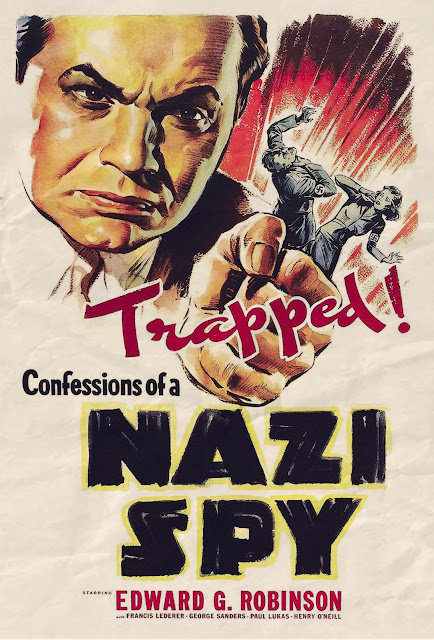My views
- Notable actors:
- Edwrad G Robinson (~46 years-old)
Plot
A silhouetted narrator connects the film to recent events, beginning in a quiet corner of Scotland in 1937. A postman delivers letters from all over the world to a Mrs. MacLaughlin, who forwards the contents of one envelope to Dr. Karl Kassel in New York City. Later, Kassel harangues an audience of German-Americans at the Café Nuremberg. Most are wearing the uniform of the German American Bund. He tells them that the Führer has declared war on the evils of democracy and that, as Germans, they should carry out his wishes and claim power. The crowd salutes, "Sieg Heil!"
Kurt Schneider, an unemployed malcontent, is inspired to become a spy and writes to Hitler's personal newspaper. German Naval Intelligence knows that he is not a double agent because the Americans have no formal counterespionage system. Franz Schlager, a naval officer sailing to New York on the steamship Bismarck, is ordered to contact Schneider. Meanwhile, beauty operator Hilda Kleinhauer informs on her clients to the Gestapo and carries material for Schlager.
An American Legionnaire challenges Kassel at a meeting. He and others speaking out for democracy are attacked.
Schneider boasts to his friend Werner, a private in the Air Corps, that he receives instructions from Hitler. Werner gets the Z code, and Schneider obtains medical records that reveal troop strength in New York. Schneider proudly gives Schlager the information and receives $50 a month, Mrs. MacLaughlin's address, and a list of new objectives.
Kassel is called back to Germany. He takes his mistress, Erika Wolff, and leaves his wife behind. The narrator provides a dramatic description of the fascist way of life. Kassel is put in charge of all Nazi activities in the United States. Under the slogan, "America for Americans," the country is flooded with propaganda while spies target military operations.
Thanks to the postman's curiosity, British Military Intelligence uncovers Mrs. MacLaughlin's role as postmistress for a worldwide network of spies. American military intelligence in New York, consisting of Major Williams and one assistant, turns to the FBI for help in exposing spies, although it has never played that role before. FBI Agent Ed Renard takes the case.
Upon his return to the United States, Kassel visits Camp Horst Wessel, where German-American children are trained in Nazi ideals and military skills.
Schneider is instructed to use an alias to obtain passports, which arouses suspicion. The FBI follows the package containing the passports and arrests him. Learning his true identity, they realize that they have a letter that he sent to MacLaughlin. Renard flatters him for hours and extracts a detailed confession. Through Schneider, Renard finds Wenz, Kleinhauer and Kassel aboard the Bismarck in port. Kassel proudly shows Renard his files on important Americans that document their racial "impurity". He tries to burn the code key, but Renard stops him. Renard confronts him with Kleinhauer, who confirms his link with Schlager.
When Renard reveals that he knows about Erika, Kassel confesses everything about the German spy organization, revealing the intricacy and scope of the network. He is released, and the Gestapo are waiting. He swears that he revealed nothing, but the men are arrested outside his apartment building.
A federal dragnet captures many agents and their accomplices. On March 13, 1938, Hitler annexes Austria. Renard warns Kassel's wife that the Gestapo men have made bail. Karl returns home from meeting Erika and lies to his wife. He packs, refusing to take her with him. She does not warn him. The Gestapo capture him and take him to the Bismarck. He is told to claim that he was tortured by FBI agents and forced to sign a false confession. In New York, Hilda receives the same instructions.
Eighteen people are indicted for espionage. Four are in custody: Schneider, Wenz, Kleinhauer and Helldorf. US Attorney Kellogg describes the role of a network of German fifth columnists in the United States and in the Nazi conquest of Europe. He calls for Americans to take a lesson, reviewing Hitler's march through Europe, demonstrating “the supremacy of organized propaganda backed by force.” The spies are convicted.
Over coffee, Kellogg and Renard discuss events in America and Europe. Renard describes Nazis as "insane." Kellogg believes that "when our basic liberties are threatened, we wake up."

Comments
Post a Comment